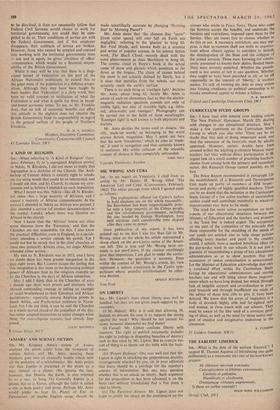'ANIARA' AND SCIENCE FICTION
SIR,—Mr. Kingsley Amis's review of Aniara analyses the poem solely from the viewpoint of science fiction, and Mr. Amis, wearing these blinkers, goes into an unusually hostile attack with all the pedantry of a schoolmaster. Mr. Amis points out that Jupiter is presented in the poem as a star, instead of a planet. (He ignores the fact, however, that Douris, the Earth, is also referred to as a star, in Song 19.) Certainly Jupiter is a planet, but so is Venus, although the latter is called a star in both poetry and prose. Perhaps Mr. Amis would prefer to hear '0, Planet of Eve' in Tannhaiiser. or maybe English usage should be
made scientifically accurate by changing 'Morning Star' to 'Morning Planet'?
Mr. Amis states that 'the chances that "snow" [from outer space] will ever fall on Earth are negligible,' referring to the 'glacion' in Song 60. But Fred Hoyle, well known both as a scientist and writer of popular science, in his science fiction work, The Black Cloud, recently dealt with the same phenomenon as does Martinson in Song 60. The cosmic cloud in Hoyle's book is the actual cause of snow and glaciers which penetrate as far down as the tropics. The chain of causes behind the snow is not actually defined by Hoyle, but it is clear that particles from the nebula can most certainly reach the earth's surface.
There is no such thing as 'roentgen light,' declares Mr. Amis, about Song 62. Surely Mr. Amis is aware of such an elementary fact as that the electro- magnetic radiation spectrum consists not only of visible light, but also of invisible light, e.g. infra- red, ultra-violet and roentgen? Photography can be carried out in the fields of these wavelengths. 'Roentgen light' is well known to both physicists and doctors.
Mr. Amis derides the terms used in Aniara, 'the silly, made-up words,' as belonging to the worst science fiction magazines. May I point out here that the term cloxodrorne,' which he cites as 'made- up,' is used in navigation and thus certainly known to seafarers. His entire criticism of the scientific content of Aniara is thus completely unfounded. TOED HALL Uppsala University, Sweden














































 Previous page
Previous page